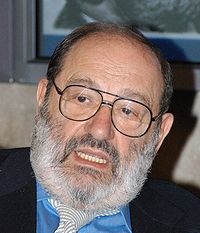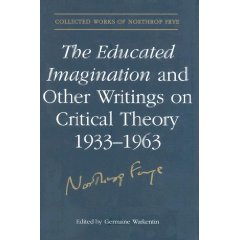
Umberto Eco
Thanks, Nicholas, for your post: this helps to clarify the connection you are making between Lonergan and Frye. I like the detective novel analogy very much: it is perhaps a useful analogy for Frye’s own process of judgment and insight.
Criticism is the act of making ourselves conscious of what is going on unconsciously when we read, and uncovering the imaginative unconscious of literature requires, to recur to another recent thread, what Frye meant by science: a combination of empirical study and deduction–and, I believe even more importantly, what the American philosopher Charles Sanders Pierce called abduction, a species of logic close to inspired hunch or guessing. I take the liberty of quoting from the wikipedia’s definition of the word:
Abduction is a method of logical inference introduced by Charles Sanders Peirce which comes prior to induction and deduction for which the colloquial name is to have a ‘hunch.’ Abductive reasoning starts when an inquirer considers of a set of seemingly unrelated facts, armed with an intuition that they are somehow connected. The term abduction is commonly presumed to mean the same thing as hypothesis; however, an abduction is actually the process of inference that produces a hypothesis as its end result. It is used in both philosophy and computing.
(Perhaps Clayton Chrusch will have something to say about abduction and computing.)
Abduction is also used by the great detectives of literature, like Auguste Dupin and Sherlock Holmes, and in another sense Frye was the greatest detective of literature, putting together the pieces of the great literary whodunit by a series of lesser, greater, and ultimately crowning acts of abduction. His great epiphanies, about which much as been said already on the blog (see in particular Bob Denham’s post), are in fact moments of startling abductive inference, in which a myriad of previous insights suddenly cohere into a radiant whole.
I have often wondered why semioticians, and for that matter the cognitivists (with the important exception of our erstwhile blogger Michael Sinding), have ignored Frye’s work. To repeat some observations I published years ago in an article on Frye and semiotics, Frye actually produced what semioticians like Umberto Eco merely postulated as possible: a coherent and detailed description of the encyclopedia of literary conventions and genres. Frye’s conclusions are in no way different from those laid out by Eco when he speaks of Barthes‘ sense of the code in S/Z as
the whole of the encyclopedic competence as the storage of that which is already known and already organized by a culture. It is the encyclopedia, and at the same time allows, gives the possibility of inventing beyond itself, by finding new paths, new combinations within the network.
Frye would also be in complete agreement with Eco’s statement that “A code is not only a rule which closes but also a rule which opens. It not only says ‘you must’ but says also ‘you may’ or ‘it would also be possible to do that.'” Indeed, invention in literature would not be possible without the existence of conventions and rules, which should be seen as enabling, not constricting innovation and originality.
Continue reading →

